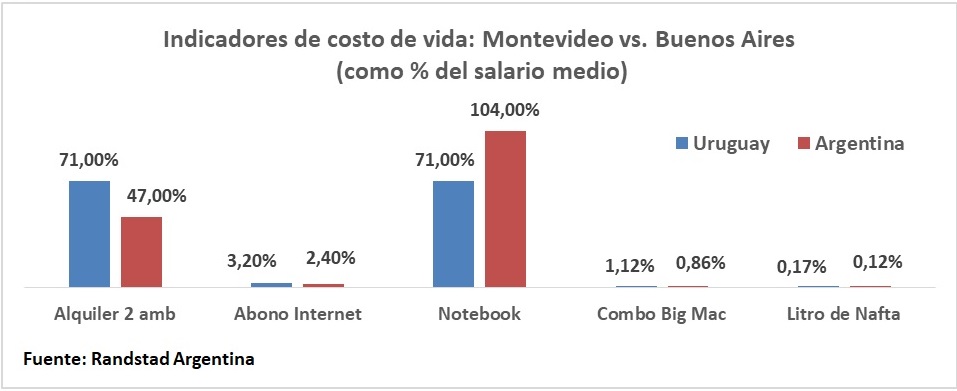
Historically, Uruguay has been an attractive place for Argentines who analyze the possibility of emigrating for work: they play in favor of geographical proximity and the similarity of customs, as well as economic stability, the low unemployment rate and a migration policy friendly to Mercosur citizens, among other factors. In this context, the human resources company Randstad conducted a survey in February of wage and cost of living indicators that allow us to have a comparative reference of what it means to work and live in Montevideo and Buenos Aires.
In Argentina, the median gross remuneration in the formal private sector is $83,324, while in Uruguay this figure is estimated at 42,360 Uruguayan pesos. In this regard, the study detailed that each country sets the minimum remuneration governed by law. The minimum living and mobile wage in Argentina is $33,000, while on the other side of the river it stands at 19,364 Uruguayan pesos.
Cost of Living Indicators in Montevideo and Buenos Aires
Randstad's survey also investigates some costs of products and services that serve as a reference for estimating the cost of living in Montevideo and Buenos Aires, which are shown as a percentage of the average gross wage values of 42,360 Uruguayans and 83,324 Argentine pesos, respectively.

The first factor highlighted, and the one with the greatest relative weight, is that of housing. In Uruguay, the rent of a two-room apartment in an average area of Montevideo ranges from 30,000 Uruguayans, representing 71 per cent of the average gross salary of the private sector. The rent of an apartment with equal conditions in the city of Buenos Aires is around 39,000 Argentine pesos, a value that represents 47% of the average gross salary of a formal private sector worker in Argentina.
Thus, the data provided by the report show that the cost of housing is considerably higher in Uruguay (about 24 percentage points), taking into account the average gross wage of each country.
Another essential expense of today's life is the Internet connection, whether it is used for leisure, study or work. A 100 MB fiber optic subscription in Uruguay starts from 1,355 Uruguayans per month, 3.20% of the average salary, while the same payment in Argentina starts from 1,999 Argentines, 2.40% of the average salary. With a smaller gap than housing, connectivity is also more expensive in Uruguay, the report notes.
The value of technology is another crucial factor impacting personal economy. According to the survey, a first brand computer, with an Intel i3 processor, 8GB of RAM and a solid disk of 256 GB is obtained in Uruguay for 30,116 Uruguayan pesos, that is, 71% of an average gross salary. Meanwhile, the same computer purchased in Argentina costs about $86,652, 104% of an average gross salary.

“At this point, it is clear that access to technology is more expensive on this side of the river, a fact that may be influenced by the tax component and regulations on the foreign exchange market and imports that Argentina currently has,” said the firm.
The basic basket and the price of food is another factor that significantly influences the pocketbook of citizens. Globally, the “Big Mac Index” produced by The Economist magazine to compare purchasing power in different countries is recognized.
Emulating this concept, Randstad's survey shows that a medium-sized Big Mac Combo can be achieved by 475 Uruguayans (1.12% of Uruguay's gross median wage) or $720 (0.86% of Argentina's gross median wage), “so this indicator has a very similar impact on average gross remuneration in both countries”, according to indicates the report.
He also stressed that due to its impact on mobility and price formation of many products and services, the cost of fuel is another item that strongly influences the cost of living. In Uruguay, a liter of super naphtha costs 70.41 Uruguayans (0.17% of Uruguay's average gross income), while in Argentina it comes out about $99 (0.12% of the gross median wage), so this indicator also has a very similar impact on both sides of the river.
Wages in Uruguay and Argentina
The survey gave an account of the reference salaries in each country for different occupations and professions. In this regard, he explained that the gross income salary of an industrial worker in Buenos Aires is around $80,000, while in Montevideo it is 30,300 Uruguayans. Likewise, the initial gross remuneration of an administrative employee in Argentina is $90,000, while in Uruguay it is around 29,650 Uruguayans.
“Going into the field of IT profiles, undoubtedly among the most demanded internationally, we see that the reference salaries of a junior programmer in Argentina start at 90,000 pesos gross, while on the other side of the Rio de la Plata a salary that starts at 50,000 Uruguayans is paid, also for a position junior”, detailed the firm.

The company stated that these data provide a general overview of reference, since the market remuneration of the different employment positions, both for professionals and executives, as well as for operating positions and middle management, “are above these initial thresholds and depend on the qualification, the highest level of education. achieved and the professional updating of the candidate, as well as his career, seniority and expertise”.
“Both in cases where a professional decides to develop their career abroad, and when they have to analyze a job proposal that involves relocation, it is very important to go beyond nominal wage values and learn about cost-of-living indicators in the destination city, since that is what ultimately determines the purchasing power of remuneration and the quality of life that you can aspire to with it,” said Andrea Ávila, CEO of Randstad for Argentina and Uruguay.
KEEP READING:
Últimas Noticias
Debanhi Escobar: they secured the motel where she was found lifeless in a cistern

The oldest person in the world died at the age of 119

Macabre find in CDMX: they left a body bagged and tied in a taxi
The eagles of America will face Manchester City in a duel of legends. Here are the details

Why is it good to bring dogs out to know the world when they are puppies




